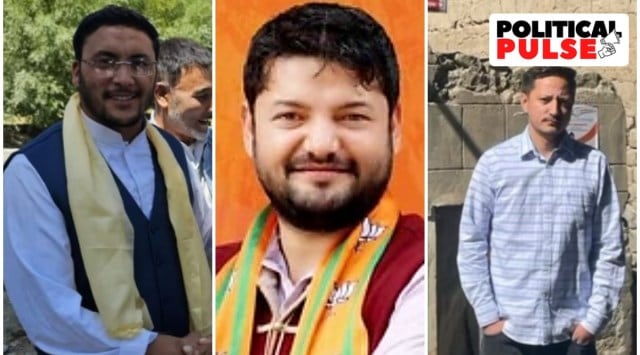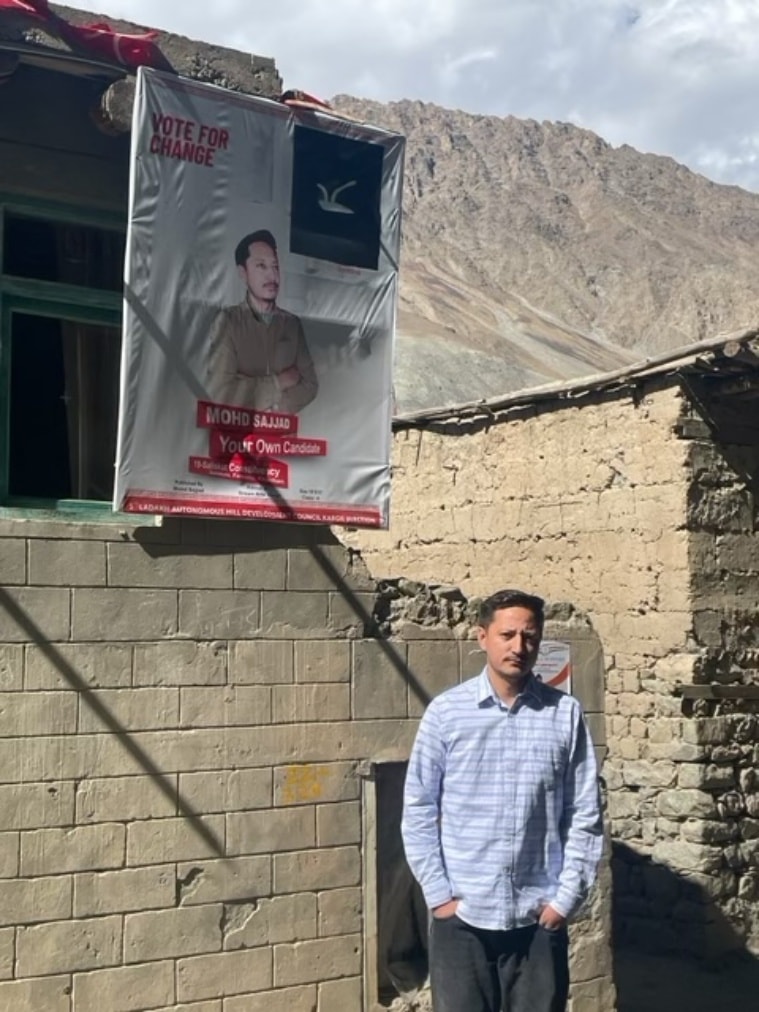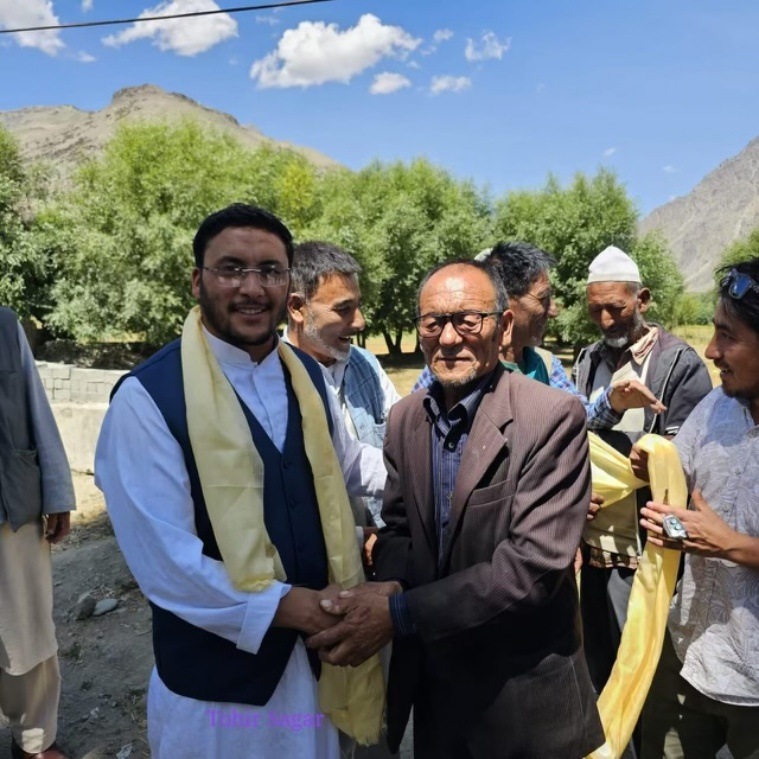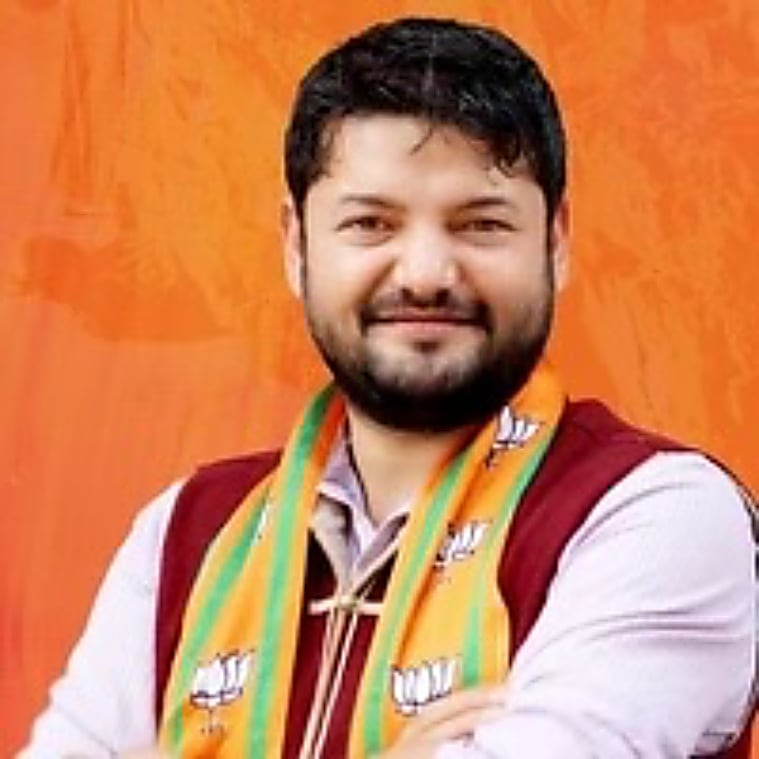Hope for pre-Art 370 abrogation to development: Why 3 young candidates are in fray for Kargil hill council
As Ladakh Autonomous Hill Development Council (Kargil) votes on Wednesday, one thing that connects the three, candidates of NC, NC-Cong unity front and BJP is concern for climate change
 From left: NC and Congress candidate from Thangdumbur seat Ashiq Ali Firdous, BJP’s candidate from Yourbaltak constituency Mohammad Hassan Pasha and NC candidate from Saliskut constituency Mohammad Sajjad Khan. (Express Photos)
From left: NC and Congress candidate from Thangdumbur seat Ashiq Ali Firdous, BJP’s candidate from Yourbaltak constituency Mohammad Hassan Pasha and NC candidate from Saliskut constituency Mohammad Sajjad Khan. (Express Photos) As Kargil votes to elect new representatives to its autonomous hill development council on Wednesday, young people are fighting for a foot in the door as the region’s new status as a Union Territory marks a shift in its politics.
Contesting their first polls, across regional and national parties, are young candidates proposing sustainable development solutions for issues like climate change and believe the council is the best forum to implement them.
A total of 85 candidates are in the fray for 26 elected seats in the Ladakh Autonomous Hill Development Council (Kargil). Results for the election will be declared on October 8. This is also the first time electronic voting machines are being used in council elections.
 Mohammad Sajjad Khan is standing from Saliskut constituency. (Express Photo)
Mohammad Sajjad Khan is standing from Saliskut constituency. (Express Photo)
Mohammad Sajjad Khan, 33, National Conference: ‘Still emotionally attached to Kashmir’
Working the phones a day before voting, between sips of salted tea, Sajjad, who is standing from Saliskut constituency, argues that with the creation of the Ladakh Union Territory, new concerns around education and jobs are not being adequately addressed.
He studied at schools in Aligarh, completed his graduate degree in Jammu and pursued his post graduation in zoology at Amravati, Maharashtra. After a stint in student politics in Jammu, he said he began to feel his own people were lagging behind.
“I wanted to work directly with the people. Councillors hardly visit the area. Our schools don’t have washrooms and our fields don’t have water. These are issues that we have to resolve ourselves,” he said.
The constituency, until now, has been represented by different members of the clergy.
On his reasons behind joining the National Conference (NC), a Kashmir-based party, he said, “We are still emotionally attached to Kashmir, and whether it’s a national party or regional, I have to raise our fundamental concerns as a representative of my people.”
The Independents in this election are also being viewed as probable proxies for the BJP, which he said, “is not a wise move at the moment”. The NC’s struggle to secure its symbol for this election and the subsequent fight in the Supreme Court, which led to polls being pushed from September to October, has also strengthened the party’s position, he says.
Over the last 20 years, according to Sajjad, climate change has reduced the annual snowfall in the area and as such, the traditional irrigation channels from melting glaciers have dried up. “This, along with rising temperatures, is changing what we grow. These are concerns now and for the future, therefore we have to provide solutions,” he says.
He added that of the 2,200 voters in his constituency, 70% are youth. Even though the council doesn’t fill the void of not having elected representatives in the Assembly, it provides empowerment, Sajjad says.
 Ashiq Ali Firdous is standing from Thangdumbur seat. (Express Photo)
Ashiq Ali Firdous is standing from Thangdumbur seat. (Express Photo)
Ashiq Ali Firdous, 33, NC and Congress: ‘Hope SC will give justice on Art 370’
One of the major concerns for Ali in this election is the slow pace of work under the new UT administration. A law graduate from the University of Kashmir, who is standing from Thangdumbur seat, he says funding for Ladakh may have increased but “that is not showing on the ground”.
The major concern for the 2,860 voters in this constituency is irrigation, a critical issue across Kargil. “Natural channels of irrigation have diminished and even drinking water is in short supply,” he says.
In 2019, he adds, the people had resorted to creating artificial glaciers to save and utilise water but the plan has not seen much success in the years since. “It isn’t a permanent solution.”
With Ali a “unity candidate” of the NC-Congress pre-poll alliance, the flags of both parties mark his home in the Sankoo area.
Ali says while the option of representation through an Assembly has been snatched from them, even the BJP MP is no help. “He does not spend his Local Area Development Fund, which hardly reaches Kargil and is mainly spent on Leh.”
Ali participated in the protests that rattled Kargil after the abrogation of Article 370. A practising lawyer in Kargil, he says its people “are holding on to the hope that the Supreme Court will provide justice in the case challenging the constitutional validity of the abrogation of Article 370”.
 Pasha who is contesting from Yourbaltak constituency says anti-incumbency has pushed him to contest his first election and challenge the status quo. (Express Photo)
Pasha who is contesting from Yourbaltak constituency says anti-incumbency has pushed him to contest his first election and challenge the status quo. (Express Photo)
Mohammad Hassan Pasha, 33, BJP: ‘Need a council in tandem with Centre’
The Yourbaltak constituency from which Pasha has been contesting has been represented for 20 years by Independent candidate and former Chief Executive Councillor of the hill council Kacho Ahmad Ali Khan, who is contesting for another term. Pasha says anti-incumbency has pushed him to contest his first election and challenge the status quo.
He chose to contest on a BJP ticket “because of the party’s central leadership and its infrastructure development in Ladakh”. Several kilometres out of the main Kargil town is where BJP banners and flags start coming into view. BJP Ladakh MP Jamyang Tsering Namgyal has also been campaigning on the outskirts of Kargil, where the party holds some influence.
Pasha talks about big ticket projects, including the under-construction Zojila tunnel, to emphasise why a council that works in tandem with the UT administration and the Central government will provide “the best-case scenario” for Ladakh.
“They can implement Central schemes and help us bring this area out of droughts that we face year on year. The BJP has shown that it keeps the promises it makes and that is the kind of development we need,” he says.
A business studies graduate from Delhi University, he claims to be creating a masterplan for a carbon-neutral Ladakh.
The constituency has 3,800 voters and, aside from Khan, there is also an NC candidate in the fray here.
- 01
- 02
- 03
- 04
- 05































